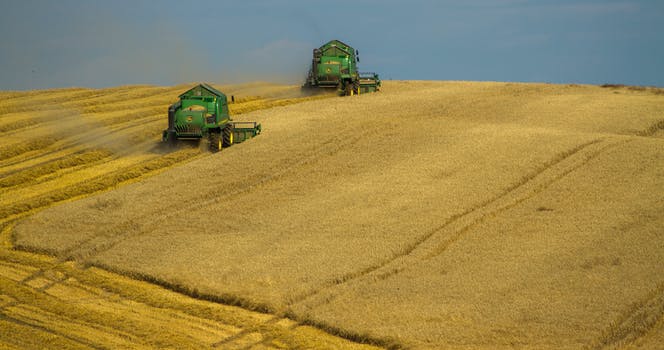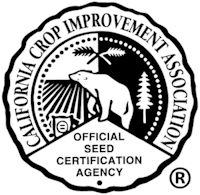Certification numbers are important on the lab reports of analysis
Seed conditioners ‐ please be sure to provide the certification number to the seed laboratory when requesting analysis for a seed sample. The CCIA recommends that seed conditioners print the "Sample Form" that is specific to a seed lot and attach the form to the seed sample when it is sent to the laboratory. Then the seed laboratory will have all the information needed to record on the report. After October 1, 2012, if a Report of Analysis is submitted to the CCIA which does not report the certification number, it will need to be reprinted by the lab before the CCIA will accept the results.
Seed laboratories ‐ please be sure to record the certification number on the Report of Analysis. When the CCIA verifies the information submitted on the lab report, it is vital that we match the information to the specific seed lot. The certification number is unique and allows the CCIA to verify the match.
Scholarship information
The CCIA provides scholarships to students attending the major agricultural universities in California. These students must indicate an active interest and participation in the seed industry, crop improvement, crop science clubs, seed packaging, seed and plant judging contests and/or activities related to seed production. Each university sets their own due dates and application specifics. For more information please contact the College or Department at each school — Chico State, Fresno State, Cal Poly San Luis Obispo, Cal Poly Pomona, or UC Davis — or Robert Stewart at the CCIA, phone (530) 752‐9826 or email: rfstewart@ucdavis.edu.

Jess Williams received the 2012 scholarship awarded at Cal Poly Pomona. Jess is currently a junior majoring in Plant Science. In addition to his academic studies, Jess works as a Tractor Shop Mechanic on the University Farm, competing on the student Professional Landcare Network team and is involved in the Los Rancheros Agronomy Club and Los Robles Horticulture Club. He also volunteers time with the Western Antique Power Association.
Craig M Diener is the 2012 California Crop Improvement Association scholarship recipient from Cal Poly San Luis Obispo. Craig is from the Five Points area of the San Joaquin area and was raised in a farming family. He will be a Senior at Cal Poly this year majoring in Crop Science with minors in Ag Business and Plant Protection. Craig’s interest are centered on agronomy and the seed industry, and he has been involved in the Vegetable Enterprise Project, Crops Club, and Alpha Zeta Professional Fraternity while at Cal Poly. He has had the opportunity to work for H. J. Heinz for the last two summers in charge of harvesting and transportation of the experimental tomato paste trials. This gave him a firsthand view of the attention to detail needed for seed quality and the amount of research involved to develop new varieties. His senior project at Cal Poly will involve working with tomato varieties ‐ comparing yield, size, color, solids and mold resistance.
Harvesting reminder
 Applicants are reminded to notify growers regarding any pertinent harvesting instructions that are provided on the Field Inspection Reports. Sometimes portions of fields have been noted as "not to be harvested" because it has not met certification standards. The growers need to have this information prior to harvest. Harvesting of certified seed is subject to supervision of the local county Agricultural Commissioner, whose office MUST be notified prior to the harvest of certified seed (California Agricultural Code, Division 18, Chapter 2, California Seed Law, Article 7, Section 52421(b)). All harvesting equipment and any conveyances used to handle the certified seed must be cleaned and verified by the county Agricultural Commissioner prior to harvest or use. The cleaning of harvesting equipment is the joint responsibility of the applicant and/or grower.
Applicants are reminded to notify growers regarding any pertinent harvesting instructions that are provided on the Field Inspection Reports. Sometimes portions of fields have been noted as "not to be harvested" because it has not met certification standards. The growers need to have this information prior to harvest. Harvesting of certified seed is subject to supervision of the local county Agricultural Commissioner, whose office MUST be notified prior to the harvest of certified seed (California Agricultural Code, Division 18, Chapter 2, California Seed Law, Article 7, Section 52421(b)). All harvesting equipment and any conveyances used to handle the certified seed must be cleaned and verified by the county Agricultural Commissioner prior to harvest or use. The cleaning of harvesting equipment is the joint responsibility of the applicant and/or grower.
Ag Commissioner information
Staff in the Agricultural Commissioner's office are able to access certified seed conditioning permits for the seed conditioning facilities in their counties at the CCIA web site. After logging in to the area "Ag Commissioner Login", there is a link to "Seed Conditioner Permits". A pdf document for each county is available with signed permits, delegation letters, and the certificate issued.
Seed Lab Recognition Program
The Seed Lab Recognition Program continues to provide additional verification to seed certification. Each seed laboratory that submits Reports of Analysis to the CCIA is audited annually ‐ a desk audit for 2 years and an onsite audit in the 3rd year. Next year the CCIA plans to include a summary report to each lab which will detail the proportion of samples checked vs. the number of samples submitted along with any identified discrepancies.
Staff focus - Catalina Oramas leaves & Kitty Schlosser retires
We are sorry to report that Catalina, who was recently hired in April 2012, has had to resign from her position due to her husband's job transfer to another state. Catalina provided additional support for field inspections and she will be missed.
 Kitty Schlosser retired from UC Davis and the CCIA on July 1st. Kitty worked in a variety of positions during her 25 years at UCD. She began her UCD career by working for 10 years at the California Regional Primate Research Center. She was originally hired as a clerk typist, then was promoted to perform Quality Assurance for the experimental procedures at the center. She worked one year at the UCD Medical Center in Sacramento developing a medical survey and then returned to campus to provide Information Technology support for Environmental Health and Safety. Kitty then moved to the Department of Vegetable Crops to manage the Research and Information Centers for both vegetables and weeds. With a B.S. in Plant Sciences, this position allowed her to return to her agricultural interests. She served as department manager for the Department of Vegetable Crops and then the Plant Sciences Department for several years before accepting the position as Administrative Manager for the CCIA. Her diversified employment experiences provided the skills necessary to manage the CCIA and Kitty thoroughly enjoyed her 6 years working with the applicants, growers, seed conditioners, and directors. Kitty is pleased that Katy Soden has been selected as the new Administrative Manager and is confident in her abilities to keep the CCIA running smoothly.
Kitty Schlosser retired from UC Davis and the CCIA on July 1st. Kitty worked in a variety of positions during her 25 years at UCD. She began her UCD career by working for 10 years at the California Regional Primate Research Center. She was originally hired as a clerk typist, then was promoted to perform Quality Assurance for the experimental procedures at the center. She worked one year at the UCD Medical Center in Sacramento developing a medical survey and then returned to campus to provide Information Technology support for Environmental Health and Safety. Kitty then moved to the Department of Vegetable Crops to manage the Research and Information Centers for both vegetables and weeds. With a B.S. in Plant Sciences, this position allowed her to return to her agricultural interests. She served as department manager for the Department of Vegetable Crops and then the Plant Sciences Department for several years before accepting the position as Administrative Manager for the CCIA. Her diversified employment experiences provided the skills necessary to manage the CCIA and Kitty thoroughly enjoyed her 6 years working with the applicants, growers, seed conditioners, and directors. Kitty is pleased that Katy Soden has been selected as the new Administrative Manager and is confident in her abilities to keep the CCIA running smoothly.
History of the CCIA - part 3
The work of the program continued to be carried in 1936 and 1937 by Jones, Briggs, and Suneson. In the mean time it was agreed by the Agricultural Extension Service and the Department of Agronomy that a man should be employed whose entire time would be spent on approved seed. It was finally agreed that such a position could best be provided for by the Department of Agronomy. The position was created and filled by F. G. Parsons, December 1, 1937. By this time it was apparent that while the use of the term "Calapproved” had many desirable features the rest of the country was confused as to whether or not it was equivalent to the term "certified" as used in other states. The use of the word "certified" therefore was begun again in 1940 by which time there were 277 growers in California with 16,358 acres.
During the next few years the acreage continued to expand with there being 18,759 acres in 1945. In 1944 the Approved Seed Plan was incorporated as the California Crop Improvement Association, thus to be more nearly in line with the type of organization elsewhere in the country. This organization was officially incorporated June 15, 1944. Its by‐laws provided for a board of directors similar in many respects to the state committee formerly governing the program. The number of elected grower representatives was increased to eight, with eight appointed representatives from various cooperating agencies. The Crop Improvement Association was incorporated as a non‐profit corporation to engage in the certification of seed, and became recognized for that purpose under the State Seed Law.
